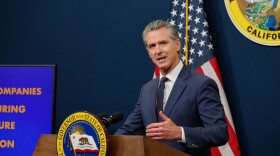MELISSA BLOCK, Host:
From NPR News, this is ALL THINGS CONSIDERED. I'm Melissa Block.
MICHELE NORRIS, Host:
And I'm Michele Norris.
Nineteen months ago, a serious illness caused Fidel Castro to transfer his presidential powers temporarily to his brother Raul. Today, Castro made it permanent. In a letter published in a Communist Party newspaper, Castro said he's no longer physically able to lead Cuba. The news came just as Cuba's parliament was preparing either to reelect him or chose a new president.
Just ahead, we'll hear from dissidents in Havana and from Cuban Americans in Miami. Our coverage tonight begins with NPR's Tom Gjelten.
TIOM GJELTEN: Today's announcement was not unexpected. Cuba scholar Marifeli Perez-Stable, of the Inter-American Dialogue, says the surprise would have been if the Cuban parliament this weekend elected Fidel Castro to another term as president.
MARIFELI PEREZ: It just would've been such an upfront to the people of Cuba to have this man even symbolically as their president again after they have not seen and only once heard him live in 19 months.
GJELTEN: Still, Cubans are living a historic moment. Fidel Castro is also resigning as commander in chief - that's a position he's held since the day in January 1959 when he took power. He ruled Cuba during the administrations of 10 U.S. presidents, all of them worked at one time or another to weaken Castro's grip, and none was successful. A point made by Philip Peters of the Lexington Institute.
PHILIP PETERS: He went out on his own terms; 50 years of U.S. efforts didn't force him out of office. He went out on his own terms and he's retiring.
GJELTEN: Whether and how Cuba changes in the coming months depends on who replaces Fidel as Cuba's leader, and on how much influence Fidel has behind the scenes. Castro will have to be replaced as the military chief, as the head of the Cuban state, and as Cuba's prime minister. His brother, Raul, had been performing these functions, but the Cuban parliament could decide to split the duties. Marifeli Perez-Stable is not sure that Raul, who's 76, will do everything Fidel did.
PEREZ: I would be surprised if that happened because that is not Raul's forte. If he were the president of the Council of State and the Council of Ministers, he would have to be traveling around the world to all these meetings, and he's not good at that.
GJELTEN: The Cuban parliament, perhaps at Fidel's suggestion, could assign some new duties to Vice President Carlos Lage who's been number three in command in Cuba, and has managed government affairs on a day-to-day basis. It's also possible that Fidel, even in the background, will continue to pull the strings. He's held power in Cuba as much to the force of his leadership as through a particular position. In the last 19 months, Raul Castro hasn't veered far from his brother's path.
Philip Peters of the Lexington Institute says the big change under Raul is that he acknowledged Cuba's economic problems for the first time, and therefore raised expectations among Cubans that more change is coming.
PETERS: He has ridiculed the bureaucracy that holds back agriculture production. In the Cuban media, they've demonstrated that a lot of their enterprises just don't work. That they're unemployment statistics are not true. And he's talked about the need to have structural changes and said that he's going to make big decisions. I think that Fidel or no Fidel, the drama of this year in Cuba is really whether Raul Castro having set-up these expectations is going to deliver or disappoint.
GJELTEN: In the short term at least, modest reforms in Cuba are unlikely to satisfy the United States. Speaking in Rwanda today, President Bush said the change in Cuban leadership should be the beginning of a Democratic transition.
GEROGE W: The international community should work with the Cuban people to begin to build institutions that are necessary for Democracy. And eventually, this transition on the lead to free and fair elections. And I mean free and I mean fair.
GJELTEN: Of course George Bush is also leaving office. Next year at this time, there'll be new presidents on both sides of the Florida Straits, and it's hard to see how U.S.-Cuba relations won't somehow be affected.
Tom Gjelten, NPR News, Washington. Transcript provided by NPR, Copyright NPR.






